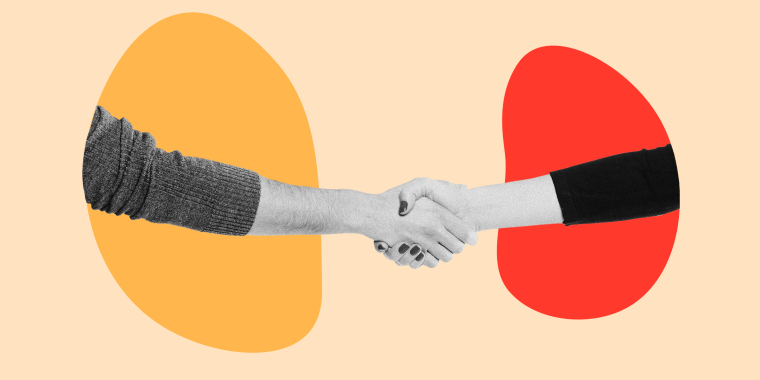If you're looking to repair a relationship or make up for a mistake, author Molly Howes, Ph.D., has the book for you.
Howes, a psychologist and author, channeled her clinical experience into a new book that details how to make an apology and why it matters.
"I saw a lot of hurt, and much of it seemed unnecessary," Howes told TMRW. "It seemed to me that it might be possible to repair the harm. ... Many of us, historically anyway, have thought that when something goes wrong, that's the end of the story. And I don't think that has to be the end of the story. I think something else is possible."
For more like this, follow TMRW on Instagram at @tmrwxtoday.
Howes said that in her view, the model of making an apology is "very hopeful" and might lead to more relationships being mended.
"I hate waste, and I think relationships get wasted," she said. "Connections get wasted, people lose relationships that they could still have, and it's better for us to have our relationships, health-wise, longevity-wise and happiness-wise."
Here are the keys to making a sincere apology:
1. Understand the injury
Howes said that to start your apology process, you first need to "understand the injury" that has been inflicted upon the other person.
"You have to learn about what their hurt consists of," she said. "Ask them and listen. During that step, nothing about you, the apologizer, matters — not your intentions or your general good nature or anything. It's just about the other person's hurt."
2. Express regret
Once you understand what you've done to hurt the other person, Howes said it's time for the second step: Making the apology itself.
"Make a statement of regret and empathy and responsibility, what we usually think of as an apology," she said. "You don't have to say 'I'm sorry,' exactly, but you could."
3. Take responsibility through restitution
In legal matters, you might have to make amends financially, but when it comes to relationships, making things right is "rarely material," Howes said.
"It's usually symbolic," Howes said. "The most likely kind of restitution in a relationship is a do-over, trying again and doing the thing that you failed to do the first time."
4. Establish a plan to never repeat the wrongdoing
Taking responsibility might seem like the end of the process, but Howes said that there is one oft-forgotten step that ends the apology: ensuring that the hurt will not be done again.
"You have to establish a convincing plan that will change the conditions enough so that you aren't set up to repeat them," she said.
Howes added that once the apology process is complete, a relationship can move on to reconciliation and reconnection — and the communication created by the apology process can often improve a relationship.
"It's better than it was before," she said. "The two people have learned about each other, learned about themselves and they've gotten through a hard thing together. They've kind of built a new support structure, which is still with them afterward, and that can make people feel more confident in their relationship going forward. They know they can handle it if something comes up again."
What can you do if someone doesn't accept your apology?
Howes said that while she thinks the method is usually successful, there's no guarantee that your apology will be accepted or that your relationship will return to how it was before.
In some cases, you can try going through the method again.
"If the hurts are big, often it takes more than one try to repair it," Howes said. "Patience is important. If you're trying to make things right with someone you hurt, they might not be ready. They might still be too hurt or raw or mad, and so it behooves you to try again."
Howes said that it's also important to make sure you're taking the other person's feelings into account, and working on their timeline rather than your own.
"Sometimes an apology isn't made or initiated in an open and curious way; it's sort of announced and forgiveness is demanded," Howes explained. "That can cause the other person to say, 'No, no way, too bad. I'm not interested.' But (making an apology) an invitation to a conversation is much more likely to end up involving both people working on it together."
In some cases, though, Howes said an apology may never be accepted — and the person who has done harm has to understand that.
"It sucks, because then you're stuck with it ... but you have to honor it," she said.
If you do find yourself in a situation where your apology isn't accepted, there are some things you can do to apologize vicariously. Howes suggests writing pretend letters, where you put everything you'd like to say on paper but never mail it.
In some more severe cases — as an example, a car accident where the driver caused injury to a stranger — you can accept your responsibility for what happened and try to make amends.
"You can learn about the injury and harm you caused someone, and then try to help people who are hurt like that," she said. In the car accident example, it could be teaching young people how to avoid making similar driving mistakes. "There are things you can do, even if you can't do it for one specific person. You can't restore the balance with them, you can't make them whole, but you can do something about restoring the community you harmed."
